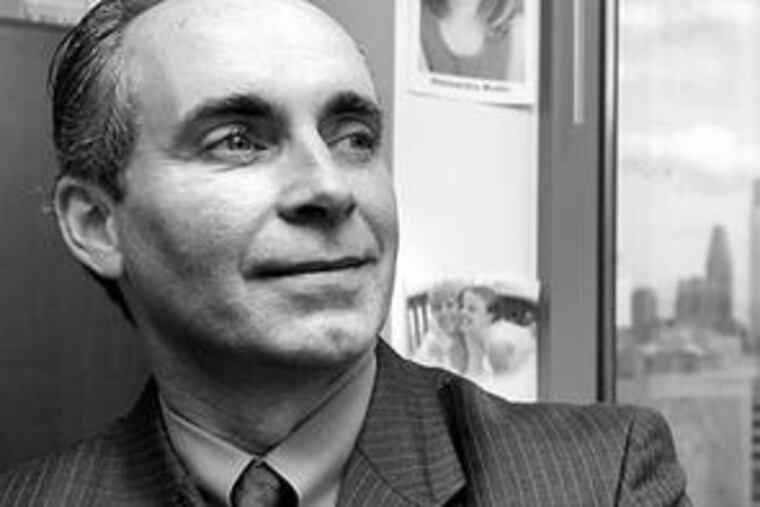
Stephen Mullin was Philadelphia's finance director and then commerce director under Mayor Edward G. Rendell.
Mullin's company provides economic consulting for titans of business and public policy. Some notable clients include Liberty Property Trust, PennDot, the Pennsylvania Convention Center Authority, Philadelphia City Council, Philadelphia International Airport, the Brookings Institution, and the government of the U.S. Virgin Islands.
Mullin also teaches urban economics and public finance at several local colleges. A club hockey player at Harvard University as an undergraduate and at the University of Pennsylvania as a graduate student, he now laces up in the senior league at the Wissahickon Skate Club.
His vision for the regional economy 10 years from now:
"Let me start with what its size will be. PricewaterhouseCoopers and City Mayors [an international think tank] looked at metropolitan regions' economies, and the Philadelphia metropolitan area is considered to have the ninth-largest economy of all the metropolitan areas in the world. I think it's one of the things that Philadelphians consistently understate.
"Basically, it's Tokyo, New York, Los Angeles, Chicago, Paris, London, Osaka, Mexico City and then Philadelphia. Everybody's reaction is 'Which one of these cities doesn't fit?' But it is at roughly $320 billion - that order of magnitude. We have a huge regional economy.
"They also forecast out to 2020. I figured, well, here comes Shanghai and all the rest of these guys, and we'll get buried. They're forecasting Philadelphia to be the eighth-largest - in other words: Up.
"So, a couple of things to note: One is that we are a big behemoth in the world. And we have a lot of dough here. So the forecast is, in the big picture: We're big players.
"I am also a huge believer that the ultimate strength of a city is what people have understood for a long time: What do you do there that people in the rest of the world buy? In other words, export.
"In the short term, with everything contracting, people say that's not important anymore. Those are the people who consistently and incredibly forget about cycles. Things will move up, and when they do, how well will we be positioned? Ultimately, you need those exports, those dollars coming in.
"Education is one of our biggest exports. People come from outside, and they pay dough to go to school here. So that is a great export.
"Health care is an export if you are doing medical research that brings in dollars from outside. Penn's certainly the big behemoth there, but Temple and Fox Chase and Jefferson are all places that I see doing more and more. That's going to be money coming in.
"Tourism is another clear export. What are we exporting? Good will and our history and having a good time. That's important.
"There is also information technology and communications, with Comcast and others. That will be hugely growing.
"And we do have manufacturing. In 10 years, a lot of manufacturing will be pharmaceutical, nanotechnology, biochemical - that newfangled sort of manufacturing - and I think we have a real leg up here.
"The sheer size of our economy will also be very advantageous. You might have seen Merrill Lynch and others saying, when they're merging with commercial banks: We need to get back to deposits - not just derivatives and stuff like that.
"We're a big economy for deposits. We have lots of businesses and lots of people. So we're going to be attractive to banks. Not that we're going to replace Dubai, London and New York, but there are parts of the financial industry that I think will be strong here.
"If you take those sectors into play, I think there's a nice potential upside there. Not skyrocketing, but some solid things."
Three steps to get there:
1. Entice banks to lend here, too. "If the deposits get lent out to build a new factory for Intel in San Diego, it's our money going there," Mullin said. "When we have banks aggressively trying to get into this market for the deposits, we have to ask, 'Will they also aggressively lend here?' "
2. Subsidize next-gen infrastructure. "Everybody thinks of a road or a bridge," he said. "In addition to that, what I'm talking about is investing in more laboratory space and modern, efficient skyscrapers like Comcast and the Cira Centre. We want our infrastructure to be really top-notch so that it retains and attracts."
3. Don't flinch from the Ph-word. "I used to scratch my head when I'd hear people talk about the 'Delaware Valley.' What kind of moron would do this, in a marketing sense? Do you ever hear people in Boston say 'We're the Eastern Cape Cod District?'
"I say 'the Philadelphia metropolitan area.' The Philadelphia metropolitan economy is the ninth-largest on the planet, and to me that's a big standout."